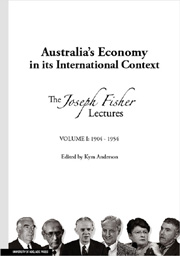Book contents
- Frontmatter
- Contents
- Preface
- List of lectures in volume 2 (1956-2009)
- Contributors to opening chapters
- The benefactor Joseph Fisher
- The lectures
- The lecturers
- 1 1904 – Commercial education
- 2 1906 – Commercial character
- 3 1908 – The influence of commerce on civilization
- 4 1910 – Banking as a factor in the development of trade and commerce
- 5 1912 – Australian company law, and some sidelights on modern commerce
- 6 1914 – Problems of transportation, and their relation to Australian trade and commerce
- 7 1917 – War finance: Loans, paper money and taxation
- 8 1919 – The humanizing of commerce and industry
- 9 1921 – Currency and prices in Australia
- 10 1923 – Money, credit and exchange
- 11 1925 – The Guilds
- 12 1927 – The financial and economic position of Australia
- 13 1929 – Public finance in relation to commerce
- 14 1930 – Current problems in international finance
- 15 1932 – Australia's share in international recovery
- 16 1934 – Gold standard or goods standard
- 17 1936 – Some economic effects of the Australian tariff
- 18 1938 – Australian economic progress against a world background
- 19 1940 – Economic coordination
- 20 1942 – The Australian economy during War
- 21 1942 – Problems of a high employment economy
- 22 1946 – Necessary principles for satisfactory agricultural development in Australia
- 23 1948 – The importance of the iron and steel industry
- 24 1950 – The economic consequences of scientific research
- 25 1952 – Australian agricultural policy
- 26 1954 – The economics of Federal-State finance
11 - 1925 – The Guilds
A survey of the old guild system, and a comparison of some of its features with our conditions to-day under our industrial laws
Published online by Cambridge University Press: 05 June 2012
- Frontmatter
- Contents
- Preface
- List of lectures in volume 2 (1956-2009)
- Contributors to opening chapters
- The benefactor Joseph Fisher
- The lectures
- The lecturers
- 1 1904 – Commercial education
- 2 1906 – Commercial character
- 3 1908 – The influence of commerce on civilization
- 4 1910 – Banking as a factor in the development of trade and commerce
- 5 1912 – Australian company law, and some sidelights on modern commerce
- 6 1914 – Problems of transportation, and their relation to Australian trade and commerce
- 7 1917 – War finance: Loans, paper money and taxation
- 8 1919 – The humanizing of commerce and industry
- 9 1921 – Currency and prices in Australia
- 10 1923 – Money, credit and exchange
- 11 1925 – The Guilds
- 12 1927 – The financial and economic position of Australia
- 13 1929 – Public finance in relation to commerce
- 14 1930 – Current problems in international finance
- 15 1932 – Australia's share in international recovery
- 16 1934 – Gold standard or goods standard
- 17 1936 – Some economic effects of the Australian tariff
- 18 1938 – Australian economic progress against a world background
- 19 1940 – Economic coordination
- 20 1942 – The Australian economy during War
- 21 1942 – Problems of a high employment economy
- 22 1946 – Necessary principles for satisfactory agricultural development in Australia
- 23 1948 – The importance of the iron and steel industry
- 24 1950 – The economic consequences of scientific research
- 25 1952 – Australian agricultural policy
- 26 1954 – The economics of Federal-State finance
Summary
Responsible people in Australia realize that all is not well with industrial conditions: but there would be wide divergences of opinion both in diagnosing the trouble and in suggesting remedies. To-night I am concerned rather with diagnosis than with remedies. I think it may be useful to take a glance backward to at any rate one of the systems of the past – to assess the good features and the bad – and particularly to determine whether such a survey suggests some line of action for our own troubles.
The Guilds of the thirteenth, fourteenth, and fifteenth centuries achieved an extraordinary success: a success merited and explained by the fine characteristics underlying their activities. Later on world conditions began to alter with everincreasing rapidity: the Guilds were too inelastic, too jealous of their privileges, to adjust to the change, and in a century or so they passed away. That is the epitomized tale of their rise and fall In their best days they were animated by excellent ideals and they were admirably suited to the conditions of those times; but, like most institutions operated by fallible men, there were less desirable features, gradually these lea to the decay, and finally the obliteration, of the Guilds.
This is neither the place nor the time for any very extended description of the Guilds, nor for my purposes is anything of that kind necessary.
- Type
- Chapter
- Information
- Australia's Economy in its International ContextThe Joseph Fisher Lectures, pp. 289 - 304Publisher: The University of Adelaide PressPrint publication year: 2009



